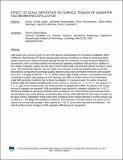Effect of scale deposition on surface tension of seawater and membrane distillation
Author(s)
Nayar, Kishor Govind; Swaminathan, Jaichander; Panchanathan, Divya; Warsinger, David Elan Martin; McKinley, Gareth H; Lienhard, John H; ... Show more Show less
Download3-IDAWC15_Nayar Effect Of Scale Deposition On Surface Tension Of Seawater And Membrane Distillation.pdf (993.5Kb)
OPEN_ACCESS_POLICY
Open Access Policy
Creative Commons Attribution-Noncommercial-Share Alike
Terms of use
Metadata
Show full item recordAbstract
High liquid entry pressure (LEP) is one of the desired characteristics of a membrane distillation (MD) membrane. Maintaining LEP above operating feed pressure conditions is critical to prevent permeate quality worsening by saline feed liquid passage through the membrane. Air gap membrane distillation experiments under controlled salinity and temperature operating conditions indicate that in addition to flux decline, inorganic scaling can also lead to feed breakthrough and permeate salinity increase in some cases. The relationship between calcium sulfate and carbonate scaling and breakthrough was further illustrated by comparing the permeate quality obtained using clean and fouled membrane with seawater brine of S = 120 g/kg as feed at t = 70 °C. While contact angle changes and pore size variation have been considered to explain salt passage and LEP decrease, the effect of surface tension of the feed liquid under MD operating conditions has not been investigated. In a previous work, the authors measured reference data and created correlations for surface tension of seawater for 1 ≤ t ≤ 92 °C and salinities 0 ≤ S ≤ 131 g/kg. In the present study, new measurements investigating the effect of scaling on the surface tension of seawater are presented. Bulk precipitation was observed in seawater solutions for t > 50 °C. Membrane distillation operating conditions were simulated in the surface tension measurements where the test-beaker was reused between experiments after rinsing, which left behind a thin layer of scalant on the glass surface. Repeatable results under these conditions show marked decrease in surface tension (up to 30% at S = 120 g/kg) from standard correlations. This reduction in surface tension can cause LEP to reduce and increase salt passage in MD systems at t > 50 °C, as has been reported in the literature. The role of surface tension changes on MD separation effectiveness is recognized.
Date issued
2015-09Department
Massachusetts Institute of Technology. Abdul Latif Jameel World Water & Food Security Lab; Massachusetts Institute of Technology. Department of Mechanical EngineeringJournal
Proceedings of the 2015 International Desalination Association World Congress on Desalination and Water Reuse
Publisher
International Desalination Association
Citation
Nayar, Kishor Govind, Jaichander Swaminathan, Divya Panchanathan, David Martin Warsinger, Gareth H. McKinley, John H. Lienhard V. "EFFECT OF SCALE DEPOSITION ON SURFACE TENSION OF SEAWATER AND MEMBRANE DISTILLATION." 2015 International Desalination Association World Congress on Desalination and Water Reuse (September 2015).
Version: Author's final manuscript